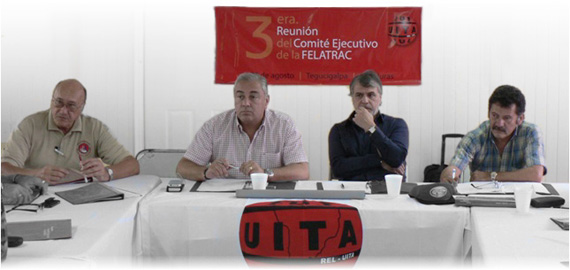|
Assessing our past
actions and identifying new strategies to go on growing and strengthening our
work, developed in the past years, were the purposes of the 3rd Meeting of the
Executive Committee of FELATRAC, held on 22 August in Honduras.
Founded on the 7 May, 2008 in Buenos Aires, Argentina,
the Latin American Federation of Coca Cola Workers (FELATRAC) has not
stopped growing and acting in defense of the interests of
Coca Cola workers
of the region.
“After two years of existence, FELATRAC is
not only a reality but also a need recognized by all unions of the industry as
an essential instrument which needs to be strengthened with a view to the
future", stated the general secretary of the Latin American Regional Secretariat
of the IUF, Gerardo
Iglesias, during his
opening presentation of the event.
After expressing their solidarity with the just struggle of the Honduran people,
union delegates from twelve
countries of Latin America discussed
the situation in each country in relation to
Coca Cola.
Also “the agenda of FELATRAC for
the October meeting with Coca Cola
Company in Atlanta, United
States, was revised, and the final membership of the Executive Committee
was approved”, explained Pablo
Quiroga, General Secretary of FELATRAC.
The meeting received the warm greeting of the Executive Board and delegates from
different local divisions of the Union of Beverage and Related Industry Workers
(STIBYS) of Cervecería Hondureña (SABMiller)
"We live the same situation that you live in your countries and we are trying to
counter the precarization of employment.
In this sense, we wish to join the work of the
IUF, and the work of all of
you. We need to be united and coordinated because when union wins are not
defended, they are lost”, said Neptalí
Castro, General Secretary of STIBYS.
With 64 unions from eleven countries of the Region,
FELATRAC is
today an instrument for “accumulating and assembling forces, defining and
developing strategies based on unity of action.
It is a response to circumstances where the weakness of the labor movement, in
many of our countries, is a consequence of ideological confusion, unfocused
programs and organizational dispersion”, concluded Iglesias.
 |